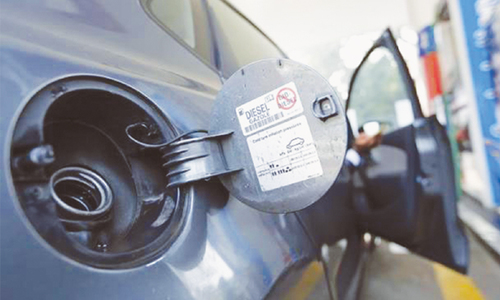ISLAMABAD: The Supreme Court on Saturday ordered a complete audit of the Pakistan State Oil (PSO) — a state-owned oil marketing company — to verify the pricing structure for the last three years and determine the fairness of the price the consumers are charged for the import of motor oil, high speed diesel and furnace oil.
A three-judge Supreme Court bench, headed by Chief Justice Mian Saqib Nisar, had taken up a case regarding exorbitant taxing, cess, duty and fees of petroleum products, and also ordered a thorough probe of heads of various government departments, including PSO Managing Director Sheikh Imranul Haq, and officials who got a hefty salary of over Rs1.5 million.
Take a look: CJP wants formula to reduce levies on petroleum products
On July 1, the caretaker government raised the price of petrol by Rs7.54 to Rs99.50 per litre, and the price of diesel by Rs14 to Rs119.3. Similarly, the price of kerosene was raised by Rs3.36 to Rs87.7. The spike in prices had raised quite a furore among the general public.
But when the apex court took suo motu notice, the cabinet, in a late meeting on July 7, slashed the price of petrol by Rs4.26 per litre to Rs95.24 from an earlier Rs99.5. Similarly, the price of the most important component of the petroleum called high speed diesel, was reduced by Rs6.37 per litre to Rs112.94 from an earlier Rs119.31 per litre.
On Saturday, the apex court also approved the terms of reference for conducting the audit which, in addition to the auditor general Pakistan, will be conducted by a private tax and audit advisory firm called KPMG International.
At the last hearing on July 8, the apex court had expressed the intention of conducting a thorough analysis of petroleum import mechanism in Pakistan by examining the prices at which it reaches the end consumers are true and not doubtful due to the involvement of hidden commission and kickbacks.
The approved ToR asked the auditors to review the pricing structure for the motor oil, high speed diesel and furnace oil sold by the PSO to identify the cost components including the related basis and assumptions used for each cost component.
The ToR also asked the auditors to review the underlying process for import of petroleum products by the PSO, including the related procedures at public stakeholder offices including the Petroleum Division, Oil and Gas Regulatory Authority (OGRA) and the State Bank of Pakistan (SBP). The auditors will also identify controllable and uncontrollable factors and comment on the transparency of the process.
The auditors are supposed to carry out procedures including a three-year review and audit of the petroleum products procured by PSO to conclude whether or not the price charged by the PSO was fair. The auditors can also carry out research of regional pricing structure and an analysis of international oil prices if, and when, required and broadly review processes followed by other OMCs to purchase petroleum products.
The court ordered that the petroleum division would ensure that all assistance was provided to the auditors by PSO and other stakeholders. The private firm will be paid Rs4.3m to conduct the audit and furnish its final report in five weeks.
During the proceedings, the court regretted that private companies had been created to dole out favours to near and dear ones.
Attorney General Khalid Jawed Khan requested the court to issue notices to oil refineries when the court asked about the quality of oil being imported in the country.
The court wondered whether the oil being imported in the country was “Ron-92” adding that a renowned car manufacturer had complained about the quality of petrol available in Pakistan.
There are allegations that the quality of oil smuggled from Iran was far better than the oil being imported in the country, the court regretted, adding that the quality of jet fuel being supplied to aircraft was also not up to the mark.
On a court query, the PSO’s MD explained that his department did not receive funding from the government, and added that the annual administrative cost of the PSO varied from Rs10bn to 12bn, whereas the total profit of the organisation was over Rs18bn. The total revenue generated by the PSO is Rs1.2 trillion per annum, the MD said.
The court then inquired about the massive salary package of Rs3.5m which was given to the PSO’s MD, and regretted that he had been awarded this prized post because of his association with an important personality in the previous government.
The court said that the MD had no prior experience in the oil sector and when inquired about who had appointed him, the MD responded that it was the former prime minister. But the court said he had been appointed by ex-premier Shahid Khaqan Abbasi, even though the MD had insisted that Nawaz Sharif had approved his appointment. The MD, however, said that Mr Abbasi had been the petroleum minister at that time.
Published in Dawn, July 15th, 2018












































